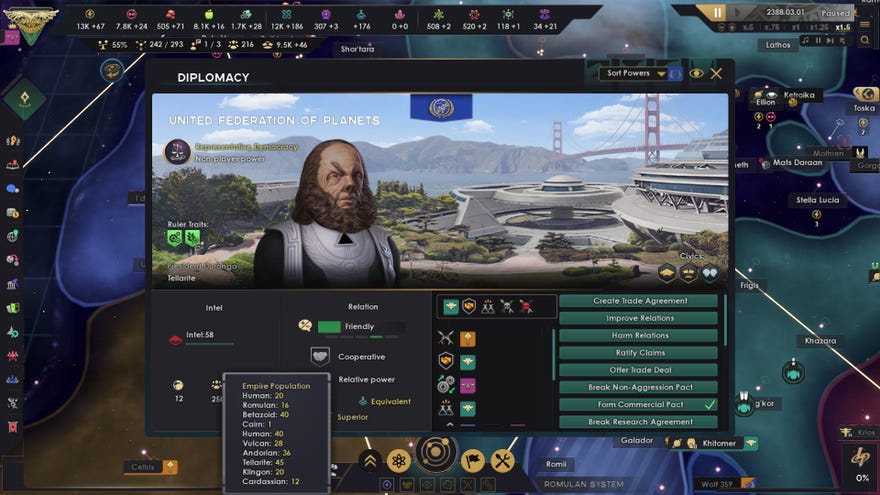Star Trek: Infinite review: Not exactly a strategy pioneer, but still an enjoyable journey
Splitting it out
I'm honestly a little surprised by how much I'm enjoying Star Trek: Infinite. It is not the ultimate Star Trek strategy game, but nor is it a bog standard 4X strategy in an unfortunate 80s leotard. "Lets you play your own Star Trek story" is a fair summary of what it's about, even if the bulk of that story in practical terms is building space stations to claim territory, and filling up planets with farms, cities, and empire-specific labour camps, forums, and whatever hippie garbage the feds have. Of course, it has the advantage of riding the coattails of already-established fiction and maybe that's cheating a little, but the result is a sort of grand 4X that in most regards I've enjoyed more the longer I played it.
I kept discovering more depth to Infinite. Admittedly, this is partly a result of its extremely limited tutorial (pre-release). Oddly, this worked out well for me. If it had tried to tell me upfront about the details of, say, population management, I'd have probably been too overwhelmed to start. Instead I threw myself in, and stumbled into something resembling competence by excavating it bit by bit. This is very much a game to dive into expecting to lose until you know what's going on. It's not exactly opaque, but there are lots of elements hidden away, not even mentioned by the optional help tips until you happen to notice the icon for trade routes or relocation.
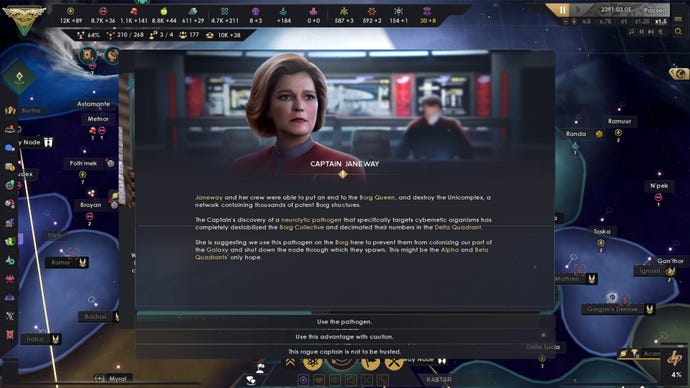
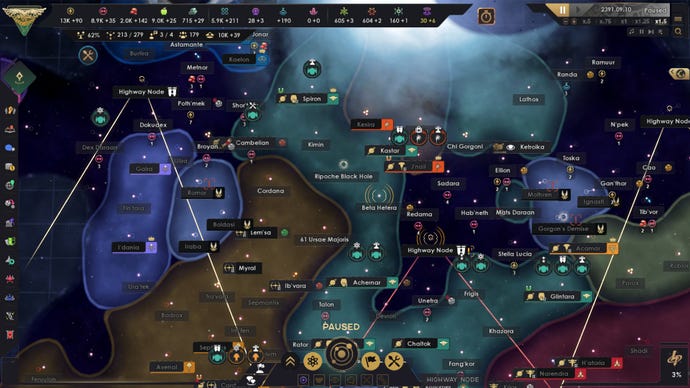
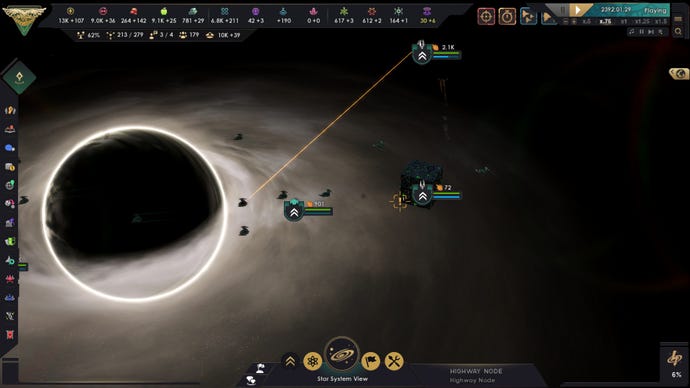
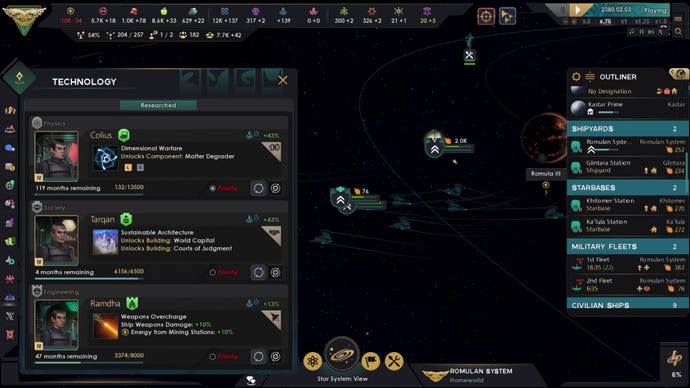
Appropriately, the game's biggest focus is on exploration. Surveying stars reveals resources for mining, and anomalies to investigate. Random events afflict colonies and people, and alien factions generate oddities too, bringing up sometimes optional event chains if poked (and sometimes if ignored). They're typically framed like the premise of an episode - a soldier has a mystery infection, a planet is making strange noises, the inhabitants of a colony have disappeared - and ask for a response, often rewarding your choice of resources or bonuses. That's often not the end of it, as many lead to branching chains, sometimes even rewarding an apparently reckless choice with a second boon later. At one point I had a colony hit by three catastrophes in a row, involving threats so major even non-viewers may recognise them. My colony was rendered 90% uninhabitable, and then it was hit by a fourth disaster. I could actually have relocated the survivors, but by then I imagined there was only one guy left on the planet and I wanted to see what he'd do. It has me deciding what's the most appropriate thing to do and what's in character.
First contact also requires an ongoing commitment and several decisions, or can be cut short when the 'minor' species reaches out and demands a response (my Romulan sensibilities say "they can eat my triangular hole"). It offers the fun thought that the Rommies and the Ker-plunk are all having their own versions of the Enterprise's adventures, but with a totally different ideological approach. Or you can be the Federation dorks, of course. I suspect it's even a little weighted towards them, considering the rewards and unique named characters they get for doing their main missions, contrasted to the Romulans getting "luck your way into the right circumstances or your homeworld will explode". This is absolutely a game that will wipe out your capital like that. But on the flip side, I totally accepted Janeway's plan to defeat the Borg, then let them kill her. Sorry, humans! Could you send another one? Perhaps that bald feller, I bet we can do him too. I mean, do it with him.
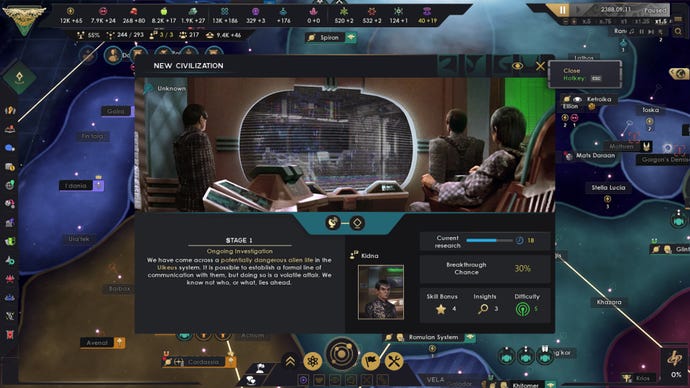
Much of your time will also be spent building up planets and their population. It's an involved system wherein each planet has slots for farms, mines, and energy production, plus shared ones for broader, civic districts. Each provides specific jobs, and a second line of slots for special buildings that make those jobs more productive. You can also designate a category to the whole planet (e.g. farm world, admin world, DEMON WORLD), which adds a flat bonus to one area while detracting for another. There's a lot of room to customise, and less rote building order stuff.
The only real sour note I've had is war, which follows the 4X pattern of being annoying and tedious. Thankfully, it uses a grand strategy model of limited wars with specific goals, sometimes explicitly meant to humiliate. But it's largely whack-a-mole, and by far the least enjoyable part of the game. Especially when you play as the Romulans, and find out too late that their spies, ostensibly the foundation of their military strategy, can't do anything during a war, and their famous cloaking devices don't make you invisible. No skirmishing, no ambushes, not even sneaking into the drive-through. But that was a fairly small part of my game. A bigger part was maintaining my research lead, which was hard to leverage into dominance because you have little control over its direction; three fields are researched at once, each offering your choice of three random technologies. This adds some variety but left me unable to use several advanced components because I hadn't lucked into a decent generator.
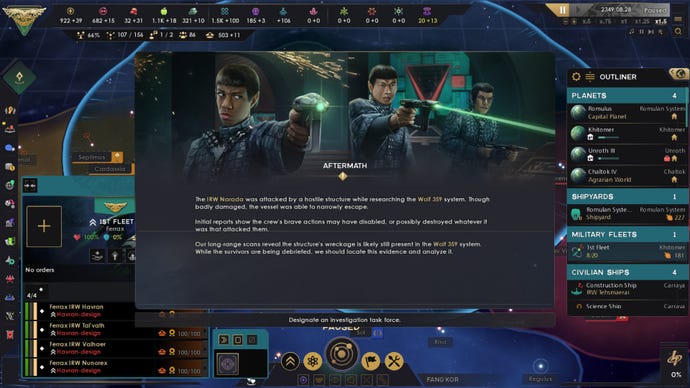
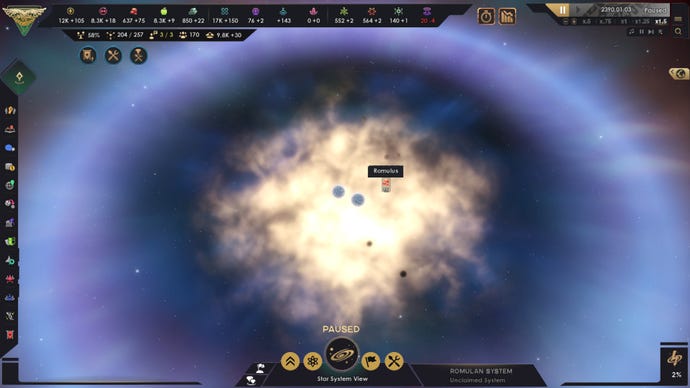
There's room for UI improvement too. Text is unreadably small, and I'm not sure if some missions glitched out, or I'd failed to understand how to trigger the next part. There's no event log, and several events don't pause the game but really should. The Borg appearing at my capital was a gentle "fleet in combat" icon, while a single alien immigrating might sound a terrifying siren; I know we're xenophobes, but. The logic behind what counts as an upgrade to ships is also bewildering, with automatic ship designs being woefully underarmed. I got frequent notices that "the silent alarm has been triggered" but had no idea what to do about it. Plus some elements like its character system are fairly inconsequential, despite the thrill of realising you could totally kill Dukat in battle.
And yet... I recorded all these complaints with a detached sort of "hmm" rather than major frustration. It's one of the most low-stress strategy games I've played this year, and its detail comprehensible once you've picked up the stone it's hiding under. It's a combination of engaging and undemanding that grand strategy seldom manages, and has enough Trek stuff to work for someone who's seen most of the serieseses but only once, and can only sometimes tell if something's a reference to an episode or wholly new. How the boon of such a familiar setting will stand against the weight of that setting's expectations I do not know, but if you go in wanting an enjoyable game that you kind of already know, Infinite will be a pleasant little surprise.
This review is based on a review build of the game provided by publishers Paradox Interactive.
